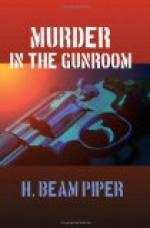For a second or so after he snapped it nothing happened, and then the darkness was broken by the flickering of fluorescent tubes. When they finally lit, he saw the shape on the floor, arms outflung, the inverted rifle above it. For a seemingly long time he stood and stared at the grotesquely transfixed body of Arnold Rivers.
The dead man lay on his back, not three feet beyond the radius of the door, in a pool of blood that was almost dried and gave the room a sickly-sweet butchershop odor. Under the back of Rand’s hand, Rivers’s cheek was cold; his muscles had already begun to stiffen in rigor mortis. Rand examined the dead man’s wounds. His coat was stained with blood and gashed in several places; driven into his chest by a downward blow, the bayonet of a short German service Mauser pinned him to the floor like a specimen on a naturalist’s card. Beside the one in which the weapon remained, there were three stab-wounds in the chest, and the lower part of the face was disfigured by what looked like a butt-blow. Bending over, Rand could see the imprint of the Mauser butt-plate on Rivers’s jaw; on the butt-plate itself were traces of blood.
The rifle, a regulation German infantry weapon, the long-familiar Gewehr ’98 in its most recent modification, was a Nazi product, bearing the eagle and encircled swastika of the Third Reich and the code-letters lza—the symbol of the Mauserwerke A.G. plant at Karlsruhe. It had doubtless been sold to Rivers by some returned soldier. In a rack beside the door were a number of other bolt-action military rifles—a Krag, a couple of Arisakas, a long German infantry rifle of the first World War, a Greek Mannlicher, a Mexican Mauser, a British short model Lee-Enfield. All had fixed bayonets; between the Lee-Enfield and one of the Arisakas there was a vacancy.
Rivers’s carved ivory cigarette-holder was lying beside the body, crushed at the end as though it had been stepped on. A half-smoked cigarette had been in it; it, too, was crushed. There was no evidence of any great struggle, however; the attack which had ended the arms-dealer’s life must have come as a complete surprise. He had probably been holding the cigarette-holder in his hand when the butt-blow had been delivered, and had dropped it and flung up his arms instinctively. Thereupon, his assailant had reversed his weapon and driven the bayonet into his chest. The first blow, no doubt, had been fatal—it could have been any of the three stabs in the chest—but the killer had given him two more, probably while he was on the floor. Then, grasping the rifle in both hands, he had stood over his victim and pinned the body to the floor. That last blow could have only been inspired by pure anger and hatred.




